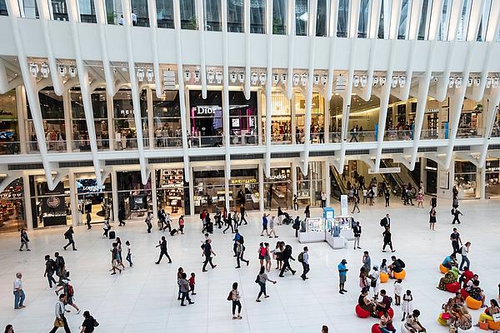Change needed! Comment on retail post-corona
Vaccinations are slowly arriving to the general population, summer is here. Time to open the doors and shutters and take a deep breath - retail will soon be past its worst phase. Or is it? Frankly speaking, that probably only applies to very few. In April 2021, the German Retail Association (HDE) predicts that the retail sector in Germany could soon be facing up to 50,000 insolvencies. The decisive factor is the behavior during the pandemic. Hard times lie ahead for all those who have not grasped the lockdown as a future opportunity and have rested on traditional sales and distribution channels. Those who have anticipated the new market conditions and, above all, consumer behavior and reacted accordingly may well have a golden future ahead of them.
Despite some efforts, retailers are still exposed to political arbitrariness. The government aid does serve to bridge the gap, but hardly anyone expected such a long lockdown period. A shorter, tougher lockdown and freedoms in the pragmatic implementation of hygiene and sales concepts - could have, could ... But what is usually disregarded in the policy criticism: The pandemic is not a time to just get over with and then everything is the same as before. Disruptive changes by new market players, digitalization and the transformation of city centers were already underway before the pandemic, were reinforced by it and will remain. The following three theses by Steffen Wagner show the acute zugzwang of the retail trade.
Thesis 1: "Click and collect as a replacement for an open store is dying in installments".
Adjustments to retailers' business models have occurred, if at all, at the point of sale channel - sometimes without regard to long-term compatibility and the post-pandemic. Policymakers sold click and collect as the retailer's savior. But what works well for large chains like IKEA cannot be a long-term solution for the small retailer in Stuttgart's pedestrian zone. This is because the associated costs are higher than the sustainable profit. In addition, click and collect, while the retailer is "actually" closed, undermines the original added value of retail: qualified and personal expert advice. In the meantime, the specialist staff has been cut as a short-term cost-cutting measure, if they haven't already gone the distance anyway. After months of being held over water, many will not be able to make their way back. After all, when things get going again, not only will there be a lack of government assistance, but also a lack of qualified personnel. From our own work with assistance in obtaining corona loans, we can say that two-thirds of the funds received are used for loss financing. A study by bachert&partner on this subject shows: one third of the companies that have received a corona loan will nevertheless be at risk of crisis after the pandemic. Some already suspect this: On Stuttgart's Königsstrasse, some stores are still full of inventory - but the tenants are no longer there at all.
Thesis 2: "The era of large retail spaces is coming to an end".
The hybridization of business models with an increasing shift to the digital space was already a must before Corona. To this end, stationary retailers must think about how they can also offer qualified expert advice in the store online - for example, via video telephony and augmented reality concepts. This trend will continue after Corona. Retailers must dismantle their oversized structures and use expensive space more efficiently. An adjustment of logistics is necessary. Those who do not have their own infrastructure and financial resources in house to pull up online landscapes should not make do with temporary solutions here either. It is better to look for partnerships and hand over the digital part of the business altogether than to do it only half right yourself. Half right means, for example, paying for a standard platform solution from a new tech company and letting the boss's husband, who was previously in sales, now do search engine optimization.
Thesis 3: "Post-Corona retail has a golden future ahead of it in urban centers".
Post-Corona retail will experience a renaissance in the long term - even if it is due to climate change. Vacationers will travel farther afield less, and individual mobility will continue to decline as people displace their own cars. In 2100, more than 90 percent of people will live in cities, instead of 50 percent today. This will mean that other forms of recreational compensation will have to emerge in the city and its immediate surroundings. The nearby city center will become all the more of a destination: concepts that combine living and living in one. Square meter prices in the city center continue to rise - we can see it in Stuttgart. All the more reason for small retailers to come up with new ideas and focus more on the experience aspect. Pop-up zones, for example, with a flexible location instead of the oversized flagship store. Or hybrid concepts - for example, like the original Stuttgart retailer Merz & Benzing, which has been pursuing this strategy brilliantly for decades.
Conclusion: "Downtowns need to reinvent themselves - but retailers shouldn't wait for that to happen."
One thing is certain: things will not continue as they have been, we are already in the midst of change. A large proportion of local retailers will no longer exist after the pandemic actually ends. Those already operating with high levels of debt should consider an orderly exit. For those with the financial capacity to act, a hybrid offering of brick-and-mortar retail and e-commerce can be the cornerstone of an entrepreneurial future. Networking among companies and differentiation of the product range also play a role here. To achieve this, policymakers must create a legal framework and cities must actively promote the transformation.
Steffen Wagner, Managing Director at bachert&partner, is a Stuttgart native and an expert on the subject of retail. As a finance expert, he previously worked for five years at a specialist for camping accessories in the mail order and retail business. A turnaround case, he was able to get the company back on track by taking over its largest competitor and developing an innovative retail strategy. When the company was finally bought by a large retail and tourism group in the course of strong growth, Wagner decided against rigid structures and to (co-)found bachert&partner. There, he assists companies in the SME sector with restructuring and reorganization, thus making them fit for the future. In addition to the usual day-to-day business, bachert&partner currently also supports companies in obtaining corona aid and is thus in direct contact with decision-makers in the respective market segments.




